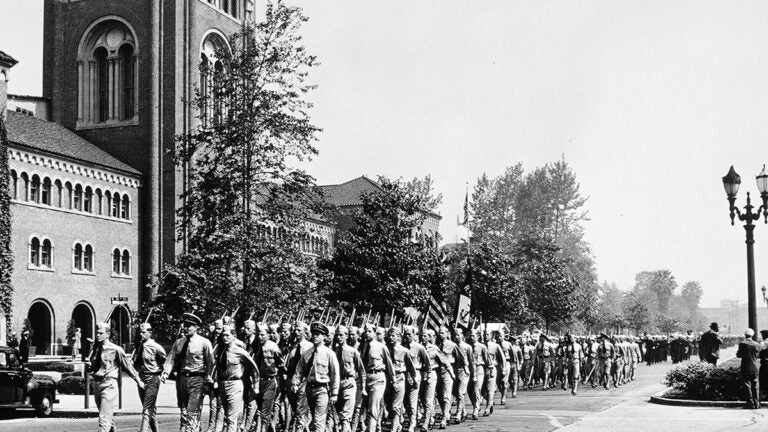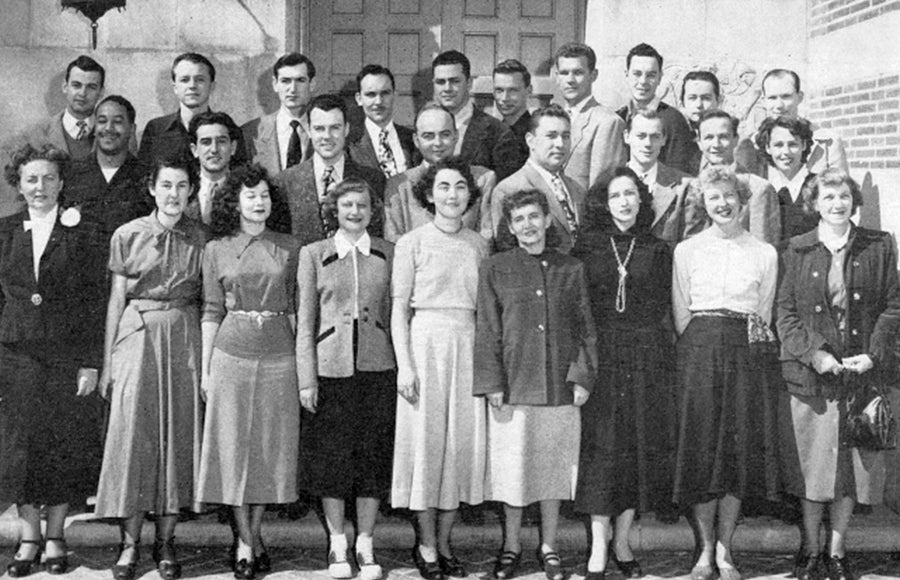
Alumna who first attended during World War II helps brighten USC’s future
As a student at USC in the years immediately following World War II, June Pollak was inspired by the resilience and forward-thinking outlook of the former soldiers who were filling up university classrooms.
“These guys came back not as boys, but as men who’d been through combat and had been overseas and ‘had seen the world.’ They were interesting, driven people who were determined to get through school as fast as possible and get a degree and get out and get a job and live a full life,” she said.
The lessons learned from those former GIs has stayed with Pollak in the 75 years since she first encountered them. As a scholar, Pollak was one of the first faculty members at California State University, Fullerton, where she helped build the English program from the ground up. Now, as a philanthropist, she has funded multiple initiatives to help graduate students and early career faculty at USC conduct research in the humanities and sciences.
Post-war student boom
Pollak was born in San Francisco in 1927. As a child, she moved with her family first to Long Beach, California, and then, during World War II, to Los Angeles. While attending Fairfax High School, June began to think about continuing her education, particularly in music.
“Everyone I knew at Fairfax was going to go to UCLA, but my mother was afraid of all the communists there. USC had a very active music school, and for me that was much more of a lure because I was trained as a concert pianist,” she said.
Back in 1945, when Pollak enrolled at USC, the school was smaller, with about 5,000 students enrolled. Most of the students were women, she said, since many men were still serving overseas. But in 1945 and ’46, that situation changed, with a “flood” of former soldiers taking advantage of the GI Bill to attend college.
During her undergraduate studies, Pollak began to gravitate more toward literature than music; she was particularly drawn to novels from England and the United States during the modern period (approximately 1900 to 1950). She ended up graduating with a double major in both music and English in 1949. After a brief stint in law school, she returned to the university to pursue an M.A. in English.
After getting her master’s degree, Pollak decided to see more of the world herself, landing a job as a secretary — “if you were a girl, you were a secretary,” she said — at CBS TV. She worked her way up the ladder until later, at the J. Walter Thompson advertising agency, she became an assistant producer of Ford Motor commercials on several television shows. But when the 1957 recession hit, she found herself returning to USC once more, this time for a Ph.D.
A woman in academia

With her recent gifts to USC Dornsife, alumna June Pollak, center front in this 1949 yearbook photo, aims to help young faculty “lead the world for the better.” (Photo: Courtesy of USC University Archives/El Rodeo Collection.)
While working on her dissertation, Pollak got a part-time job teaching at California State University, Northridge. She hoped to be hired as a professor there once she finished her dissertation, but she was passed over in favor of four men, none of whom had finished their dissertation. The chair of her department at Northridge advised her to go to California State, Fullerton, which had only been founded a few years before. The chance to get in on the ground floor appealed to Pollak. She applied and was accepted, and though she was one of very few female faculty members there, she said her colleagues were supportive and encouraging.
“I went to Cal State Fullerton, and it was the best thing I ever did. I helped build that campus from scratch. It was an exciting place to be,” she said.
A few years after starting at Fullerton, Pollak, by then in her 40s, met her husband, George, through a mutual friend. The two had actually attended Fairfax High School around the same time, though they hadn’t known each other back then.
“He was born in Vienna, Austria. His father stood in line at the American embassy in Vienna for the better part of a year to get visas, which were very hard to get, so they were lucky. They got out two months before the borders closed,” she said.
Philanthropic partners in life
The couple had no children. Pollak said that their philanthropic initiatives were their way of extending a hand to future generations. Together, they created the Salz-Pollak Endowed Faculty Research Fund in Humanities, which provides summer and sabbatical grants to faculty in the humanities at the USC Dornsife College of Letters, Arts and Sciences. After her husband died of Alzheimer disease, Pollak planned a gift to USC that would help fund graduate student research on the disease, which she described as completely devastating.
“He’d been so bright. The best conversations I ever had were with my husband, and he lost his ability to speak. The person you know just disappears in front of you,” she said.
Pollak has also recently given a gift to establish the Salz-Pollak Fellowship, an endowed faculty fellowship in the English department that provides funding for an assistant or newly promoted associate professor to take a semester-long, funded sabbatical to focus on their research.
“Assistant professors have to do research, publish, teach, and they’ve got young families, all at once. So, if they could have a breather, that would help with the research and the writing, and that is something I’d like to help with,” Pollak said.
Pollak hopes her gifts will inspire freedom of thought that will aid people in the years to come.
“I have a super optimistic view that people with a higher education are more open to new ideas and less prejudiced. I know that’s not always true, but I hope that the best and the brightest will try to lead the world for the better.”